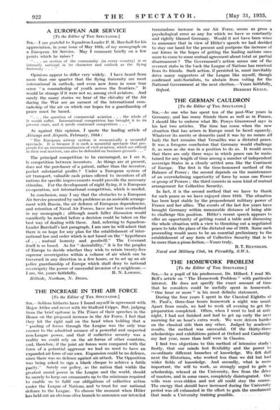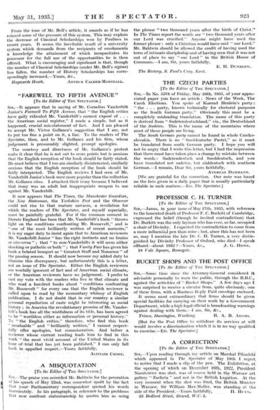THE HOMEWORK PROBLEM [To the Editor of Ti: SPECTATOR.] SIR S —As a
pupil of his predecessor, Dr. Hillard, I read Mr. Bell's article on " The Homework Problem " with particular interest. He does not specify the exact amount of time that he considers could be usefully spent in homework. " One hour or more " is his most definite statement.
During the four years I spent in the Classical Eighths at St. Paul's, three-four hours homework a night was usual. Apart from meals, we had to work all evening to get the preparation completed. Often, when I went to bed at mid- night, I had not finished and had to get up early the next morning for an hour's extra, work. We were driven harder on the classical side than any other. Judged by academic results, the method was successful. Of the thirty-three scholarships and exhibitions gained at Oxford and Cambridge my last year, more than half were in Classics.
I find two objections to this method of intensive study : firstly, that our minds lost flexibility and the power to co-ordinate different branches of knowledge. We. felt dull next the Historians, who worked less than we did but had wider fields of knowledge. And secondly, what is more important, the will to work, so strongly urged to gain a scholarship, relaxed at the University, free from the drive of masters, and in some cases, completely disintegrated. Our wills were over-ridden and not all could stay the course. The energy that should have increased during the University period was all exhausted in the effort to gain the emolument that made a University training possible. From the tone of Mr. Bell's article, it sounds as if he has relaxed some of the pressure Of this system. This may explain the decrease of Classical Scholarships won by Paulines in recent years. It seems the inevitable result of a university system which demands from the recipients of emoluments a knowledge the attainment of which incapacitates its possessor for the full use of the opportunities he is then offered. What is encouraging and significant is that, though the number of Classical Scholarships (under Mr. Bell's regime) has fallen, the number of History Scholarships has corre- spondingly increased.—Yours, &c.,



























































 Previous page
Previous page